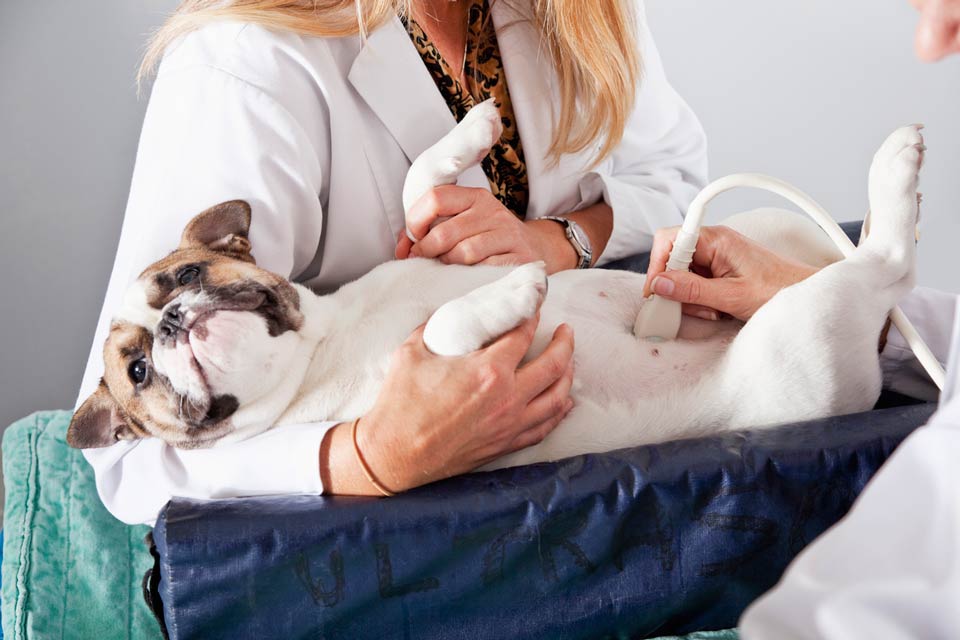Ultrasound: What Is It and When Do Vets Use It?

An ultrasound is a procedure in which sound waves are used to create images of the structures inside of a dog's body.
When Are Ultrasounds Recommended for Dogs?
Ultrasounds are great for evaluating a dog's internal structures in real time, while x-rays provide only a snapshot in time. Ultrasound doesn't offer information about bones or the lungs but is ideal for studying soft tissue structures and organs. An ultrasound might be suggested by your veterinarian in the circumstances listed below, though this is not an exhaustive list.
- To diagnose pregnancy or count puppies.
- To look for tumors inside organs or in the abdominal or thoracic cavities.
- To help guide needles into organs or masses to obtain fine needle aspirate samples.
- To evaluate how the blood is flowing through the heart and identify abnormalities.
- To look for problems in the bladder, including cloudy urine that might indicate the presence of infection or debris and bladder stones.
- To gain information about joint fluid.
How Is Ultrasound Performed on Dogs?
Most of the time, dogs don't need to be sedated to have an ultrasound done. There are exceptions if the dog is particularly painful, scared, or aggressive or if the doctor needs the dog to be perfectly still to perform an ultrasound-guided fine needle aspiration into a sensitive structure.
The dog usually lies on a table, and the area where the ultrasound probe will need to be placed may be shaved. Lube is applied to the area, and the probe is placed. The ultrasound technician or veterinarian moves the probe into different angles and spots to get varying views of the area(s) of interest. Still photos might be printed at various times, and the entire ultrasound might be recorded so the veterinarian or a specialist may look back on it.
Where Are Ultrasounds Performed and How Much Do They Cost?
Some general practitioners have ultrasound machines, and they may feel comfortable performing and evaluating various types of ultrasounds. Sometimes a dog must be referred to a specialty center or veterinary school for ultrasound. In the case of cardiac ultrasounds, most of the time, the dog is referred to a veterinary cardiologist.
Ultrasounds may cost varying amounts depending on what the doctor is evaluating. They will also be more expensive when performed at a specialty clinic or by a cardiologist because part of the cost is the evaluation of the results. Generally, canine ultrasounds cost between $200 and $500.
You May Also Like These Articles:
Common Blood Tests Done on Dogs
X-Rays in Dogs: What Can They Tell Your Vet?
Fine Needle Aspiration: What Is It and What Does It Tell Your Vet?
CT Scans for Dogs: What Are They and What Information Do They Provide?
MRI in Dogs: What Is It and When Is It Done?
Disclaimer: This website is not intended to replace professional consultation, diagnosis, or treatment by a licensed veterinarian. If you require any veterinary related advice, contact your veterinarian promptly. Information at DogHealth.com is exclusively of a general reference nature. Do not disregard veterinary advice or delay treatment as a result of accessing information at this site. Just Answer is an external service not affiliated with DogHealth.com.
Notice: Ask-a-Vet is an affiliated service for those who wish to speak with a veterinary professional about their pet's specific condition. Initially, a bot will ask questions to determine the general nature of your concern. Then, you will be transferred to a human. There is a charge for the service if you choose to connect to a veterinarian. Ask-a-Vet is not manned by the staff or owners of DogHealth.com, and the advice given should not delay or replace a visit to your veterinarian.



